The ceasefire that couldn't heal: Reflections from a survivor
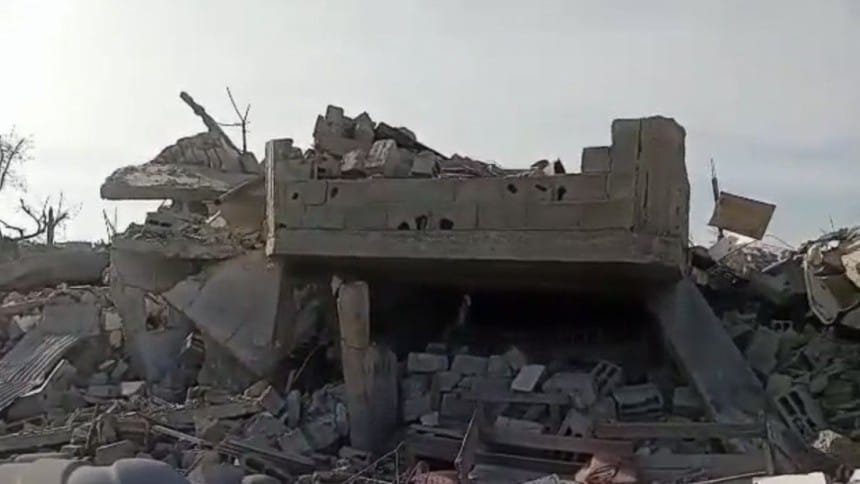
Late September 2023, I returned to Gaza from Faridpur to see my family. It was my 24th birthday. I have been studying medicine in Bangladesh, and it was the first time in four years that I visited them. A few days later, we all knew what had happened. After seven months of genocide, I left Gaza and my family behind. My story of surviving the genocide was covered by The Daily Star in May 2024. I am not one to share my sorrow or pain, but I agreed to let a journalist document what happened to me so that Israel could not achieve its final victory— erasing these atrocities from human memory.
During those weeks when I shared what I went through in Gaza, there was talk of a ceasefire, but it never seemed likely as things only worsened. I was in Gaza during a temporary truce, which was reported as a "halt in fighting," but it was a farce. We went to our house, already bombed once, to retrieve food for the camps. We left quickly as the house was bombed again during that pause.
Months passed, and I have lost 35 family members to date. I lost my cousin Jamal, who was like a brother to me. The day he was killed by Israeli airstrikes, my uncle, Jamal's father, tried to bury him in Jabalia. But the Israeli had sieged the area. Jamal's body was left with a cloth, and today, five months later, he has still not been buried. As I write this, I wonder what Jamal did in this cruel world, to not even get the chance to rest peacefully and with dignitu, even after he was killed.
My immediate family have been displaced almost daily and injured. Changes happened around the world but things remained the same in the north of Gaza: in horror. The government changed in Bangladesh, where I've been since leaving my family in Gaza. Similar to the internet blackout during the last days of the previous regime here, my family still goes without internet for five to seven days at a stretch.
On a random Wednesday, January 15, 2025, we all got the news that a ceasefire had been reached. My first reaction was an overwhelming urge to celebrate with my family, just as I had suffered the flames of war with them. Then a strange feeling overtook me. Seven months of genocide flashed across my mind like a reel. I can't forget October 7, the day I had been asleep in Gaza for just seven days before the war began. I understood nothing back then and could not, in my worst nightmare, imagine all that followed: displacement after displacement, hunger, fear, thirst, and exhaustion.
I can't forget the days in Gaza's hospitals—the sight of dismembered children and the cries from phosphorus burns. I can't forget escaping Gaza through an Israeli checkpoint, fearing every moment that I would be shot or bombed. I can't forget the bitter cold of the night we slept in an open tent, with torn clothes and no blankets. I hugged my brother just to keep warm. I can't forget returning to our first camp, Al-Falluja, where decaying corpses were everywhere.
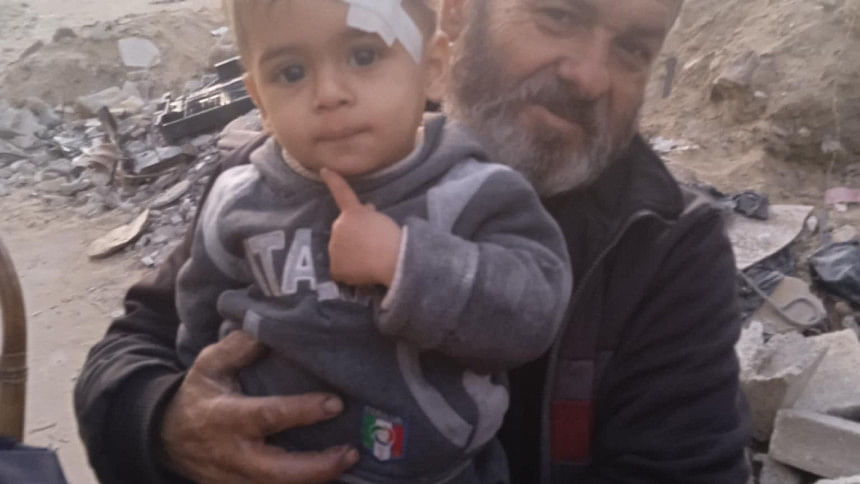
The feeling of joy dissipated, and I did not believe the ceasefire would hold. Growing up in Gaza, always fearing Israeli attacks and enduring the genocide, has eroded my trust in everything. I never trusted anything the Israeli government said. They killed, destroyed, and ruined my life as I knew it. Frankly, I don't remember what my beloved city, Gaza, looked like before the war or what it felt like without the smell of death. So, how can I believe they would stop killing now?
Just days before the ceasefire, my parents were taking refuge with other stranded residents in a small room of a broken house in southern North Gaza. I could not reach my family when the ceasefire was announced, and at the time of this writing, I still haven't been able to talk to them, as they do not have internet. But I heard there was relentless shelling. Until the ceasefire came into effect on Sunday, I worried my family would not live to see it. The Israeli army indiscriminately bombed everywhere to claim more so-called "victories." We had been lucky, by God's grace, to survive so far. I always prayed but feared that luck would run out.
My cousin Sayed, who has periodic internet access and updates me on my family's whereabouts, informed me they evacuated their shelter but made it out safely.
Now that the ceasefire is in effect, people ask if I am happy. But how could anyone from Gaza, especially those who lived through the genocide, relate to the word "happiness"? The house I grew up in has been destroyed. My family takes shelter wherever they can—in rooms of houses that survived the bombings. Many residents from the North fled to the South, and when they return, my family will be homeless. The streets of North Gaza have been destroyed with such depravity that even a tent cannot be set up.
I truly believe no one can understand how terrible it is unless they see it with their own eyes. Yet still, I feel a sense of relief that the bombing has stopped, even if temporarily, and people have stopped dying—a thought that once seemed too distant. In Gaza, "peace" now means not hearing the thunderous sound of bombs, and a pause in the constant struggle for survival.
Thinking of my family's condition has made me feel like giving up, but I returned to Bangladesh alive, with the dream of becoming a doctor. I continued studying, but it was not without challenges. After returning, I would suffer severe trauma shocks. They would start with chest pain, and I would fall unconscious, on the verge of heart attacks. My roommates, who took me to the CCU, later told me I hallucinated snipers and blood. But I am one of the lucky ones. I made it out alive after seven months. For my family members and friends who lost their children and parents, the psychological trauma is immense.
News stories now focus on Israeli hostages being reunited with their families, while Palestinians are referred to as "prisoners." The Israeli army has randomly and arbitrarily arrested people. The worst day of my life was December 18 last year, during the second paper of my final medical exams. I woke up to messages from my cousin Sayed that the Israeli army had besieged the shelter where my family was in Beit Hanoun. Their neighbours were killed. My mother was injured by shrapnel while escaping.
They arrested my brothers Nahid, 21, and Mohammad, 22, my grandfather, who is over 70, and my father. None of my brothers had any affiliation with Hamas. What crime did they commit other than trying to survive? My father was released, thankfully, but my brothers and grandfather remain in an Israeli prison, enduring torture. Everyone in Gaza knows what the prisons are like—prisoners are given no place to sleep, nothing to eat, and are beaten as though they are not human beings.
I don't know why my father was released but my brothers weren't. The way the Israelis imprison Palestinians is arbitrary and ruthless. Each time I see the news, I hope to see my brothers freed before the next tragedy strikes. I don't trust the ceasefire will last or that the war will permanently end. The perpetrators' nature is betrayal.
The Israeli army told us to go to "safe zones," only to bomb them. They tricked people, even children, into death. I fled to so many such zones only to be forced to leave again. Many escaped alive—if they were lucky—while thousands died.
The hope that the US, with the transition from Biden to Trump, will make the ceasefire last does not inspire trust. The US has always supported Israel's killings, as have other powerful countries. At 25, I have lived through five flare-ups caused by the Israeli army, armed by countries that support their actions. In Gaza, the world showed no mercy to the elderly, children, women, youth, homes, streets, mosques, schools, or universities. They tried to annihilate us, but they cannot destroy our determination to not give up.
We Gazans dream that one day the sun will rise for us and never set again. Until then, we keep going, even if it means dying in the process. There may be a ceasefire now, but any form of trust that lives will be spared has ceased to exist.
When I left for Bangladesh, my father told me, "We know our fate, but you have a different fate. Go and become a doctor." Every day I wake up, I remember those words with a sinking feeling in my chest, and I go on with life. Because what else can I do? In Gaza, we are hardwired to keep going—and so, that's what we do.
Kamel Abu Amsha is a Palestinian medical student in Faridpur Medical College.
Views expressed in this article are the author's own.
Follow The Daily Star Opinion on Facebook for the latest opinions, commentaries, and analyses by experts and professionals. To contribute your article or letter to The Daily Star Opinion, see our submission guidelines.

 For all latest news, follow The Daily Star's Google News channel.
For all latest news, follow The Daily Star's Google News channel. 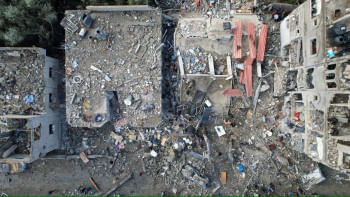


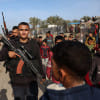
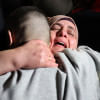

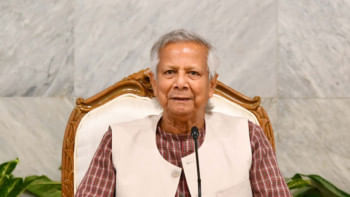
Comments